Beer hunter: We find Britain’s best rural tipple
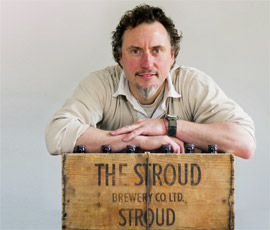
Nutty. A real thirst quencher. A pleasant haymaker.
Those were just a few of the words food and drinks guru Nigel Barden used when he tasted the entries for the Farmers Weekly Best Rural Beer Competition 2012, eventually settling on our winner, Five Valleys ale brewed by Greg Pilley (pictured).
Nigel was in our offices, sipping his way through the scores of entries. Britain’s farmers, we know, grow some fabulous malting barley. Country people enjoy a tipple. And there are some wonderful microbreweries in rural areas, many of them on farms. So we put the three together and came up with this competition – a unique way to celebrate the quality and diversity of these products. Soon, recommendations were flooding in. Some brewers nominated their own products, others were put forward by happy customers who were fans of their wares.
Britain’s small-scale, regional beer industry is, after all, experiencing a renaissance. It’s a fallacy it’s just quaffed by middle-aged men with beards and wool sweaters – in fact, it’s enjoyed by men and women of all ages and backgrounds.
There’s a growing interest in local beers, in the way there has been in local foods and The Society of Independent Brewers (SIBA) reckons annual production among small brewers is growing by around 10%.
Our wonderful local beers are the perfect complement to the wonderful local food produced by so many farmers.It’s also increasingly enjoyed in a range of different situations, circumstances and occasions. People are appreciating beer, savouring it. Like wine, it’s got its own vocabulary. Beer, in short, is cool again.
Our expert tester, Nigel, spent a morning tasting all the entries. Radio 2 listeners may well have heard him talking about the subject on Simon Mayo Drivetime.
It was a “blind” tasting, with each offering numbered and poured out of sight. He was interested in the nose, the taste and “the journey south into his stomach”, the beer ideally “ending up in my gut like a happy Buddha”.
Nigel remembered only too well the industry’s bad old days. “We nearly lost our brewing tradition. It wasn’t so long ago people drank the same beers all over Britain and they tasted consistently the same: rubbish.
“But there’s been a real renaissance in the past decade. And it’s not surprising, given we grow such good ingredients in the UK.”
Eventually, he came up with a shortlist of eight and from it his overall winner, Five Valleys from Stroud Brewery.

Nigel’s judging comments
It was a pleasure tasting my way through such a strong field of entries, although with 50 of them, I did have to pace myself. Fortunately the Farmlife team were on hand to rub my stomach every half hour, as George Kennedy did to Paul Newman in Cool Hand Luke as he ate a similar number of boiled eggs! Emptying the spittoon was less pleasant.
“It’s marvellous that so many brewers are keen to share the provenance of their grains and hops. A fair number of the breweries are situated on farms, some of them setting up microbreweries to bolster their agricultural portfolios.
“Although beer sales are declining in the UK, real ales are still on the increase and thankfully we now have more than 1,000 breweries, many of them on the micro scale. In 1970 we were down to a measly 140.
“Growing up on a Lancastrian beef and sheep farm, it’s been a more recent joy getting to know about the world of grain. It’s great that our home-grown barley and hops are being put to such tasty use.”
| The top eight | |
|---|---|
Winner: Five Valleys 5% Turning an interest into a business, former farmworker and Soil Association organic food promoter Greg Pilley (main picture) established Stroud Brewery with help from a grant from the England Rural Development Programme. Using local Cotswold malt, Maris Otter barley from Gloucestershire and First Gold hops from Herefordshire, the brewery has created an organic chestnut-coloured ale named after the five rivers that meet in Stroud. It reminds me of a malty elixir we used to give to horses on the farm. It’s got a great balance of sweetness and alcohol, with a lovely gluey varnish smell, which in this case is no bad thing. | 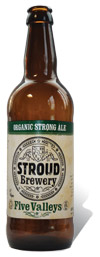 |
Gower Power 5.5% Mid-brown in colour with a punchy barley sugar nose to beckon you on. This beautifully balanced IPA (India pale ale) has an alcoholic, gentle celery taste and is much better than it sounds. It delivers flavour on many levels, from a brewery only established in 2011. Follow the advice on the label, this is “best enjoyed with a good view”. | 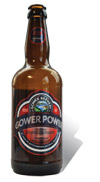 |
Scarborough Fair IPA 6% Set up with a grant from DEFRA by Tom and Gill Mellor on their 243ha family farm, Wold Top Brewery’s barley is malted locally, with 150 casks of ale going out each week. The remaining beer is bottled, with 10% going for export. This brew is a gluten-free mix of Wold-grown malt, maize and a trio of hops, resulting in a light golden glassful with a gentle lemon aroma and a touch of sweetness as it disappears down the gullet. Chill well and it’s the perfect summer ale for picnics and watching beach cricket. | 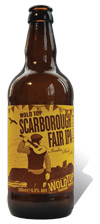 |
Budding 4.5% Another organic belter from the hugely talented Stroud brewing posse, who rolled out their first barrel in 2006. This pale ale is golden in colour, with a gently fruity enticing nose, leading to a floral, well-rounded mouthful. Thankfully the taste lingers for some time afterwards and is spot on for celebrating the first signs of spring. Named after Edwin Beard Budding of Stroud, who invented the lawn mower in 1830 and would have found happy solace in this exalted brew after a heavy morning’s strimming. | 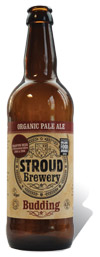 |
Hoppy Helper 4% The brewery takes its name from Red Dwarf and was set up in 2007 by Phil Wilcox and his dad, Jeremy. Phil was a passionate home brewer as an impoverished student. With the success of the brewery they’ve incorporated more of their own farm buildings and planted half an acre of hops. The Hoppy Helper enjoys a light creamy mousse, leading to a very particular smell of grapefruit, emanating from the use of American Cascade hops. The East Anglian malt is Maris Otter and this light, punchy brew is dangerously quaffable. | 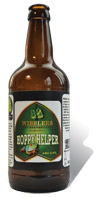 |
Harvest’s Gold 4.7% Four generations of Hodgson have farmed the soils of Holderness in East Yorkshire, with their first beer being brewed at Gt Newsome Farm in May 2007. They now turn out five cask and five bottled beers and have struck gold with their excellent Harvest’s Gold using First Gold and Golding hops. It tastes pleasantly of alcoholic barley sugar underpinned with orange. They even swap casks with other like-minded brewers around Britain. Selections of their bottled beers are available and look out for the Hodgson festive brew, Yule Do. Yorkshire humour, you can’t beat it! | 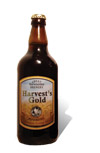 |
Monty’s Sunshine 4.2% Made by brewster Pam Honeyman, who started out as a teacher before converting a welder’s workshop into Monty’s Brewery in 2008. This Great Taste Award winning ale, made on a sunny January day (hence the name), was Pam’s first brew. It has a distinctive honeyed nose and enticing butterscotch taste, perfect for mature hard cheese or smoked meats. | 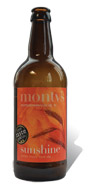 |
Dark Side Stout 4.5% A rich, dark brew only normally available on draft to those lucky enough to live near Telford. It whiffs of treacle and coal dust but there’s a touch of mango fruit once in the mouth. For some time afterwards you’re left with a warming, malty, gentle Bovril taste in the pit of your stomach. A marvellous winter ale made from Quench, the aptly named organic malted barley, home grown on Jim Preston’s family farm and brewed in a converted Victorian cattle shed. | 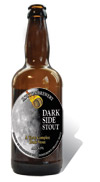 |
Where the surplus went
You probably think we took it home or squirreled it away for the Christmas party, don’t you?
Both were tempting – but we sold it and donated the proceeds to The Katie Haines Memorial Trust, a charity that raises awareness of the dangers of carbon monoxide (CO), set up by former Farmers Weekly team member Avril Samuel after the tragic death of her daughter Katie.
Each year in the UK up to 50 people die and more than 4,000 are poisoned by this odourless, toxic gas, known as the “silent killer”. CO is produced by incomplete combustion of fossil fuels used in central heating systems, gas appliances and fires such as mains or bottled gas, coal and wood and petrol, oil or paraffin – so farming families should be aware of the risk and have an audible CO alarm.
We’ve launched an online map to identify rural breweries and help you find ones in your area. Find it at www.fwi.co.uk/beermap and if you want a brewery added, email fwfarmlife@rbi.co.uk.
